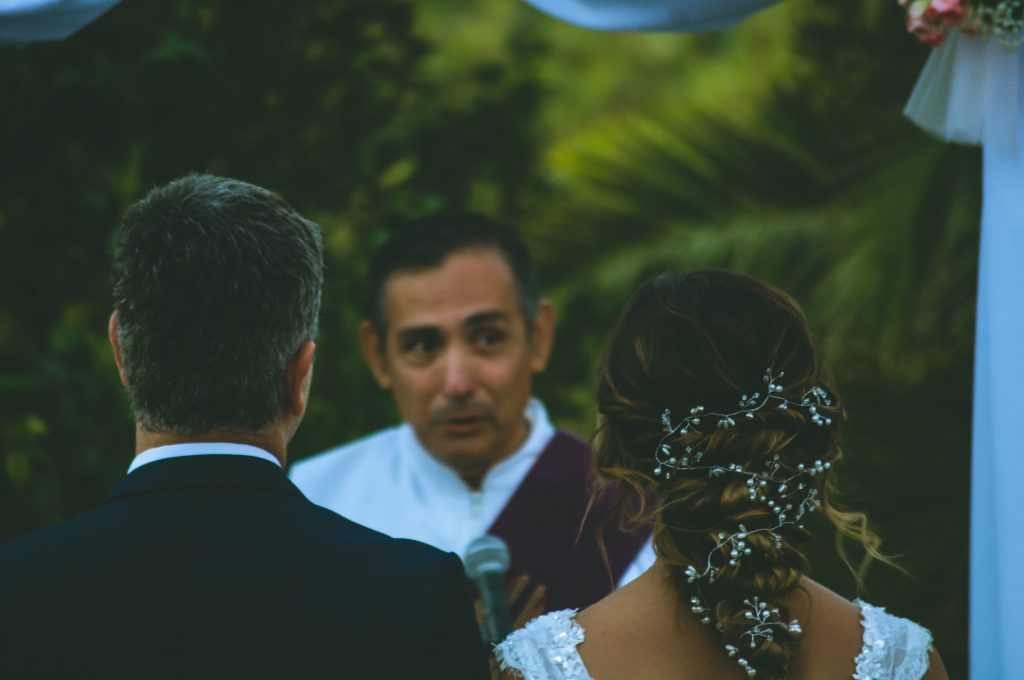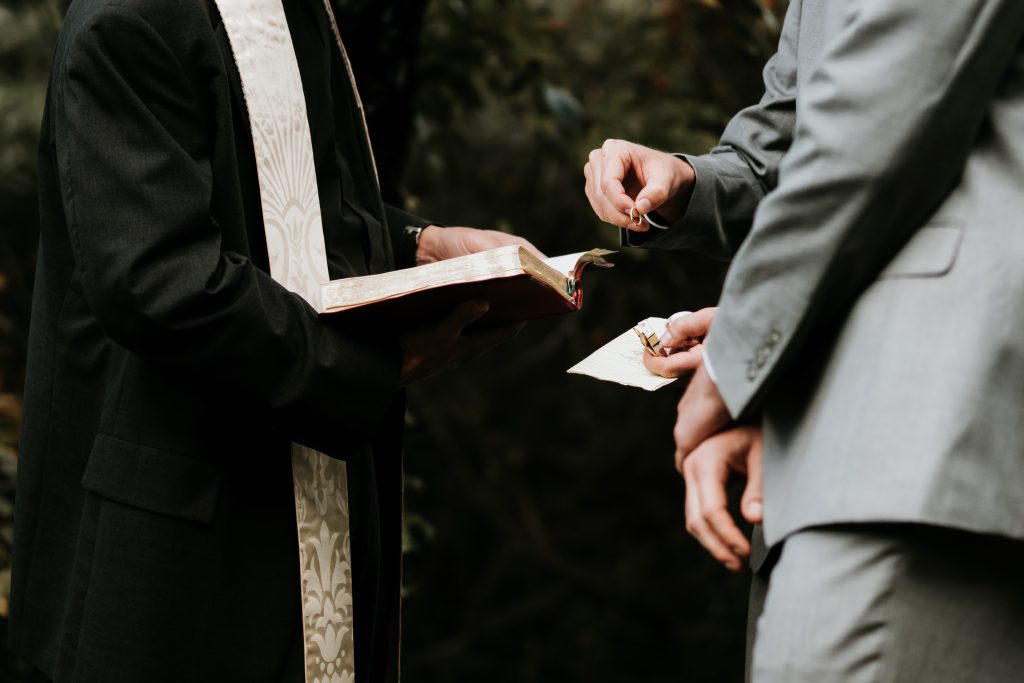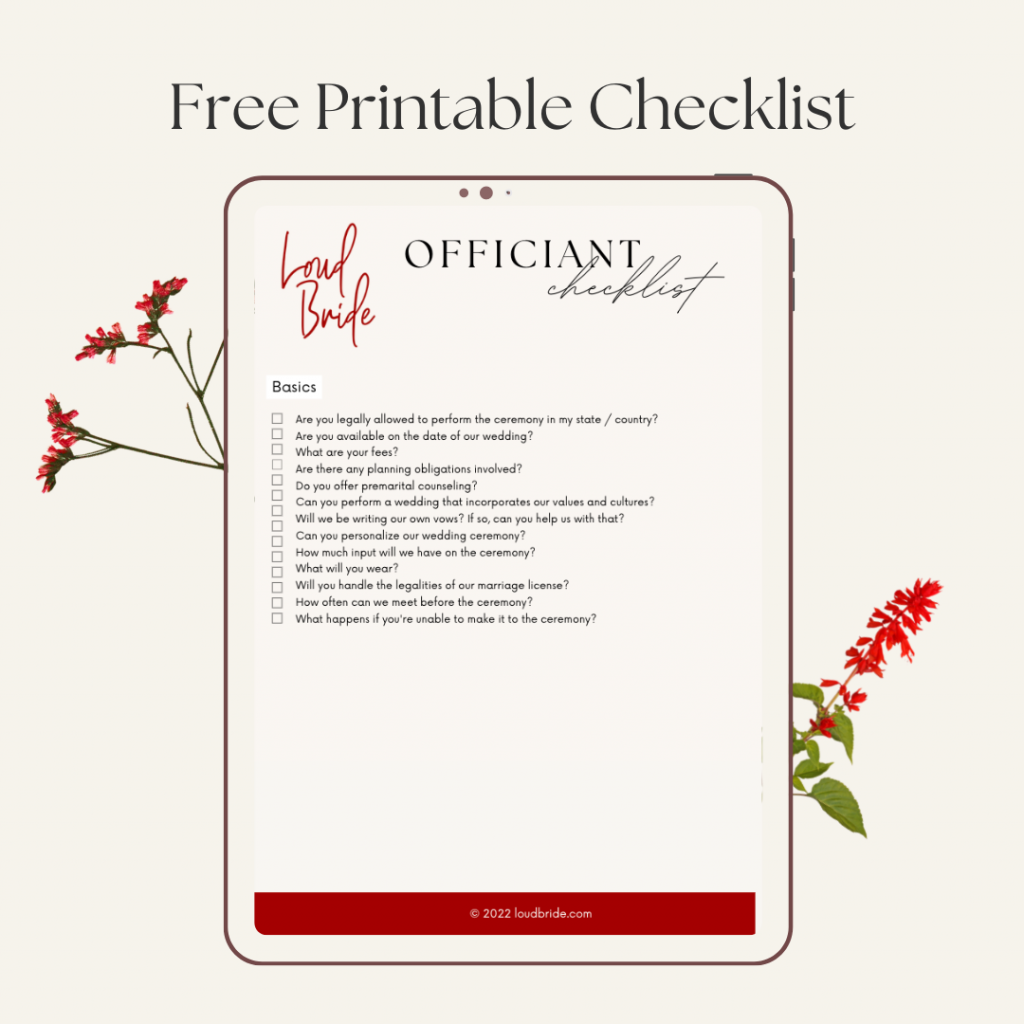
Between searching for a venue, a florist, a DJ, a photographer, and a decent caterer, taking the time to find an officiant might seem like the last task on your wedding to-do list. However, considering that this person is going to be an integral part of the ceremony, uniting you and your partner in marriage, it’s safe to say that this is not a decision to make lightly.
When hiring a wedding officiant, you’ll first want to consider whether you want to engage the service of a professional (and the fees involved). Other tips on hiring a wedding officiant include doing your research and getting to know your officiant (their values and public speaking skills).
However, there are still many additional factors to consider before taking the leap and choosing your wedding officiant. Therefore, keep reading through the following sections to learn more about how to hire the right person to unite you and your partner in marriage. Moreover, if you have any additional questions about the process, I assure you they’re going to be answered here, so consider this your ultimate guide to hiring a wedding officiant.
Who Can Officiate a Wedding?
By this point, you know a bit more about your options when it comes to finding an officiant for your wedding. However, you’d be surprised to learn just how many choices you have. So, it’s time to answer once and for all: “Who can officiate a wedding?”.
A wedding can be officiated by a spiritual leader, a city hall officiant, a justice of the peace, a professional secular officiant, or even a friend or family member. In some states, you can even officiate your own wedding.
As you can see, there’s no shortage of options when it comes to finding the right wedding officiant. This is especially true for those looking to hold secular ceremonies and aren’t committed to specific traditions.
Having a loved one officiate your wedding is quickly becoming one of the most popular choices for couples. Through this approach, you’re able to get a far more personalized ceremony while also saving on officiant-related expenses, which is always a plus.
Can You Officiate Your Own Wedding?
If you’re not a big fan of traditional weddings and are simply looking to elope, you might be wondering: “Why do I need an officiant at all?”.
What you’re thinking about is called “self solemnization,” and it refers to a self-uniting marriage. Those who partake in the practice don’t need an officiant present to have their marriage recognized by the law. To some, it might seem too good to be true. So, can you actually officiate your own wedding?
You can officiate your own wedding in some states, including Pennsylvania, Kansas, the District of Columbia, Wisconsin, Nevada, Maine, Illinois, and California. However, always check your local laws and regulations to make sure you can legally officiate your own wedding.
As you can see, self-solemnization is far more common than you think, so as long as you live in a state where the practice is legal, you can easily hold a ceremony with just you and your partner (and maybe a select few loved ones) present. If a private, personal wedding is what you’re after, this is an excellent option for you.
Does a micro wedding sound appealing to you? Check out this article to learn just how much you can save by keeping your invitation list limited.
How much does it cost to hire an officiant for your wedding?
The cost of having someone unite you and your partner in marriage can vary widely, so bear with me as I take you through some possible scenarios.
A professional wedding officiant can cost anywhere from $250 to $800. However, depending on the type of ceremony you’re having, the costs can differ. If your officiant is a loved one or spiritual leader, their services might be free or simply require you to invest in a gift or a donation.
This is the price you’ll have to pay for the service that this person is providing. There may be additional costs for travel or certification which I will get into more detail on later in this article.
If you’re having a religious wedding, you’ll have to consult with your place of worship to discuss all things cost-related. When hosting a ceremony in a religious setting, you often have no say when it comes to who your officiant will be, as a member of the clergy (or another spiritual leader) is usually appointed to you.
Curious how long a church wedding is? You can ask your officiant or read this article to know before you book!
In that case, you might not even have to pay the officiant anything, at least not directly. Depending on the policies of your place of worship, you might not even be allowed to pay or tip the person officiating your wedding. However, you might be required to make a donation, so make sure to ask about the costs you’re going to incur beforehand.
If the officiant is simply an acquaintance of yours, some form of pay or even a gift is in order. However, if the person taking on the role is a close friend or family member, you might have a simpler time ironing out the details. Chances are, this person won’t accept any form of payment from you. However, a small gift would still be an excellent way to show your appreciation.

How To Hire the Right Wedding Officiant
As mentioned, the process of hiring a wedding officiant will take some time and consideration; however, this doesn’t mean it has to be overly complicated. As long as you read through the following guidelines and keep a few tips and tricks in mind, you’ll be able to find the right person far sooner than you might think.
Here’s what you’ll want to consider when hiring a wedding officiant:
The Type of Ceremony You’re Having
The first thing to consider when looking for a wedding officiant (or any other wedding-related product or service, for that matter) is the type of ceremony you’re having. The overall feel and atmosphere you’re trying to create will dictate whether you might want to go for a more traditional officiant or if you’re open to a more unconventional option.
For example, you’ll first want to determine whether the ceremony will be religious or secular. If it’s the former, you’ll likely want to look for a priest, rabbi, or another spiritual leader to carry out the ceremony. If your wedding is going to be more secular, you’ll have a broader range of options to choose from.
You can always seek out professional officiants who offer these services for a living. Professional wedding officiants aren’t always religious, so if you don’t want a religious ceremony but still want to enlist the services of a pro, you won’t have to worry about finding someone that aligns with your values.
However, if you want your ceremony to feel more personal, you can always enlist the help of someone who’s already in your and your partner’s lives. This person can be anyone from a priest or rabbi to a friend or family member. However, you always want to check your local laws and regulations to make sure that the person marrying you and your partner is legally allowed to do so.
On the other hand, if you do want a religion-based officiant but don’t want to have your wedding at a church, you can still do so. However, you do have to make sure beforehand that the clergy member (or another spiritual leader) you’re trying to hire is okay with the setup. This is yet another reason (among many others, which I’ll discuss later on) why meeting several times with your officiant before the actual ceremony is a must.
Getting to know the person who’s going to marry you and ensuring your personalities and values match is the most fool-proof way to guarantee a flawless ceremony.
Your Budget
Another essential factor to consider when choosing a wedding officiant is, of course, your budget. If you’re already planning a wedding, you don’t need me to tell you that it can be a costly affair. However, have you factored in the expenses of hiring an officiant?
If you’re planning on asking a friend or family member to officiate your wedding, you might not have to pay anything. However, the etiquette here will heavily depend on your closeness to the person.
The only exception to this rule is if your officiant wants to provide their services as a gift. If they vocally express this wish, you might not have to spend anything.
However, you’ll have to keep in mind that you might have to spend extra on travel, accommodation, and meals depending on how long your ceremony is and where it’ll be located. Therefore, keep these factors in mind when budgeting your officiant expenses.
Moreover, in some cases, the etiquette might require you to tip the professional for their service; however, I’ll be discussing this topic more in-depth in one of the following sections.
Not sure if an officiant fits into your budget?
You can check out my free budget guide if you sign up for my newsletter. It automatically calculates what you should spend where based on your budget and guest count and helps you stay on track. It’s like the fairy godmother of numbers.
Asking the Right Questions
After determining the type of ceremony you’re having and your budget, you’ll be left with a pool of people to choose from, all of which meet your base criteria. All that’s left to do now is research and get to know some of them to determine which is the best fit for your wedding.
Therefore, as soon as you have a better idea of who you want to carry out the ceremony (a spiritual leader, a loved one, or a secular wedding officiant), it’s time to dive into some research. If you’re looking to hire a pro, you can always check out reviews and testimonies from previous clients.
On the other hand, if you want to have a loved one officiate your wedding, you can start thinking about the people who would be best suited to such a high-pressure role. At any rate, by the end of the research process, you’ll want to end up with a handful of options to choose from.
After that, it’s time to interview each of the people you’re considering to get a feel for how well your personalities and values match. This is especially important if you’re paying a professional for the service.
During the process, take mental (or actual notes) of their voice, how they make you feel, what you like, what can be improved, how cooperative and flexible they seem, and whether they seem to understand what’s important to you.
It’s also crucial to see whether you’re on the same page regarding what you want the ceremony to look and feel like. If you have any specific requests about religious mentions (or lack thereof), be sure to mention them upfront.
This is also the best time to ask some important questions. I’ll list a few below, but feel free to add or remove as many as you want, depending on what’s important to you.
Questions to Ask a Wedding Officiant
Here are some questions you can ask your wedding officiant before you hire them:
- Are you legally allowed to perform the ceremony?
- Are you available on the date of our wedding?
- What are your fees?
- Are there any planning obligations involved?
- Do you offer premarital counseling?
- Can you perform a wedding that incorporates our values and cultures?
- Will we be writing our own vows? If so, can you help us with that?
- Can you personalize our wedding ceremony?
- How much input will we have on the matter?
- What will you wear?
- Will you handle the legalities of our marriage license?
- How often can we meet before the ceremony?
- What happens if you’re unable to make it to the ceremony?
By asking your officiant these questions, you’ll be able to get a better grasp of how your personalities match while gauging whether they’re actually up for the job.
If you’re having a loved one carry out the service, make sure to have them test-read their speech beforehand. That way, you’ll get a better idea of how their words and tone will translate on the big day. This is a perfect task for the rehearsal if you don’t get a chance to test their speech out beforehand.
Read more about what else you should be doing at the rehearsal here.
Do You Give the Officiant a Gift?
You don’t have to give the officiant a gift if you’re paying them for their services. However, if you’re enlisting the help of a friend or family member to carry out the ceremony, getting them a gift is an excellent way to show your appreciation.
If you want to express gratitude to your officiant, a simple thank-you note or card should suffice. However, if you want to go that extra mile, here’s a list of gift ideas that are appropriate for a wedding officiant.
Do You Need To Tip a Wedding Officiant?
You don’t technically need to tip a wedding officiant; however, it’s good etiquette to do so. If you’ve hired a professional secular officiant, tipping them around $50 is usually the norm. However, if the ceremony is being carried out by a spiritual leader, they might not accept tips.
In that case, you might be able to express your gratitude by making an additional donation to your place of worship. However, don’t be afraid to ask your officiant about tipping practices beforehand.
Do You Send Your Officiant a Wedding Invitation?
You don’t need to send your officiant a wedding invitation. They have a contract and are aware of the logistics, so sending an invitation to the ceremony is not necessary. However, if the officiant is a loved one, you should send an invitation anyway.
Do You Invite an Officiant to Your Wedding Reception?
You don’t need to invite your officiant to your wedding reception. However, if during the preparation process you’ve formed a positive connection with this person, inviting them might be a nice way to express your gratitude. If your officiant is a loved one, sending an invitation is a must.
In short, it’s all up to you. If you feel like you want to express your gratitude and can make a little room in your budget, inviting your officiant to your reception is a lovely gesture.
However, keep in mind that this is a professional you’re paying for a service, just like the caterer, DJ, or florist. So, if paying a couple hundred bucks for their presence and then paying some more for an extra seat at the reception seems like overkill, it’s perfectly acceptable to not invite your officiant to your reception.
Do You Invite an Officiant to Your Rehearsal Dinner?
It is customary to invite your officiant to your rehearsal dinner but not required.
Since your officiant is the main host of your rehearsal and plays an important role in the wedding, they generally expect an invitation to the dinner immediately following your rehearsal.
Many busy professional officiants will decline the invitation. But ones who are in from out of town may take you up on the offer. Friends or family members who are performing the service should absolutely be invited and will likely attend.
You don’t have to send them a formal invitation. Just bring it up during one of your planning calls or via email before the rehearsal to check if they plan to attend the dinner after.
Final Thoughts
As you can see, there’s a lot of thought and attention that goes into finding the right wedding officiant. However, as long as you keep the tips mentioned throughout this article in mind, you’re bound to find someone that will make your wedding ceremony that much more special and memorable.
Otherwise, you can always take on the job yourself (provided you live in one of the states where self-solemnization is legal). Whichever approach you choose, make sure to view the points discussed above as general guidelines and to always tailor your approach to your specific vision and goals.

